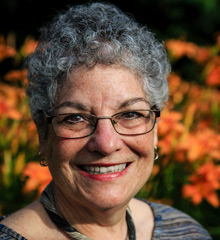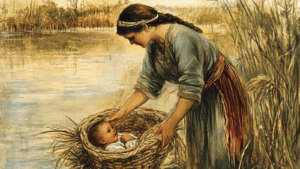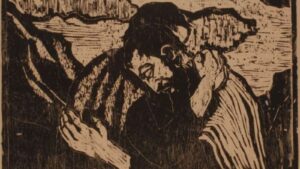I love the stories of the women in the Old Testament. Many we know well — RuthThe great-grandmother of David. More, NaomiThe mother-in-law of Ruth. More, the matriarchs, HannahThe mother of the prophet Samuel. More, EstherQueen in Persia who prevented an anti-Jewish pogrom. More, and more. So, a question: Who would make your list of the top five most interesting women of the Old Testament that most people have never heard of? Here are mine:
- HagarSarah's maidservant, Abraham's concubine, Ishamel's mother. More, mother of IshmaelThe son of Abraham and the Egyptian woman Hagar. More
You’ve probably already heard of Hagar. But have you read her stories lately in Genesis 16: 1-16 and 21:8-21? In her first appearance, she, the Egyptian slave to SarahAbraham's wife and mother of Isaac. More flees oppression into the wilderness. Note the irony of the PentateuchThe Pentateuch is a Christian term the first five books of the Old Testament. These books contain stories of Israel's early history, God's covenants, and many laws such as the Ten Commandments). More telling us a sympathetic story about an Egyptian fleeing the Hebrew slavery of Israel’s primary ancestors, AbrahamGod promised that Abraham would become the father of a great nation, receive a land, and bring blessing to all nations. More and Sarah. In the wilderness Hagar receives an angelic annunciation that parallels that of Mary: You have conceived and shall bear a son; you shall call him Ishmael! And in response, Hagar bestows on God a new name, the only person in Scripture granted this privilege. In Hagar’s second story in Genesis 21, the story of this shadow matriarch parallels Abraham’s angelic encounter in Genesis 22. But rather than express willingness to sacrificeSacrifice is commonly understood as the practice of offering or giving up something as a sign of worship, commitment, or obedience. In the Old Testament grain, wine, or animals are used as sacrifice. In some New Testament writings Jesus' death on the cross as the... More her son, Hagar refuses to look on the death of her son. Her staunch and equally faithful response to the potential death of a beloved child is met by God hearing the cry of her child and opening her eyes to see before her the life-giving water. Hagar, this Egyptian slave, becomes a model of ancestral resistance to oppression and faithfulness. Powerful indeed! - Shiphrah and Puah
OK, technically these are two women, but they are a matched set. Their story is found in Exodus 1:15-22. Shiphrah and Puah are the two named midwives whom the unnamed pharaoh commands to kill the male children of his Israelite slaves. In a lovely twist of the Hebrew, we are not certain whether these two are themselves Hebrew slaves who refuse to betray their people or Egyptian midwives, representing the ever-present righteousA righteous person is one who is ethical and faithful to God's covenant. Righteousness in the Old Testament is an attitude of God; in the New Testament it is a gift of God through grace. In the New Testament righteousness is a relationship with God... More foreigner. Either way, this pair chose the preservation of life, their professional identity, motivated by “fear of God” over obedience to their king. They are rewarded by the God of Israel and given families. These two women are joined in Exodus 2:1-10 and 4:24-26 by Moses’ mother, sister, and wife, ZipporahWife of Moses. More, as well as pharaoh’s own daughter as a company of women who rescue the savior (draw him out of the chaotic waters) so that he might rescue others, drawing all of Israel out of the waters. Well, now I am up to six women I am counting as one! - RahabWoman who sheltered Joshua's men when they came to spy on Jericho. More, woman of Jericho
In Joshua 2:1-21 and 6:23-25 we are told of another fascinating foreign woman, this time a prostitute no less. Her profession is never held in judgment; rather, she is honored as the woman who protects the Israelite spies. Like Shiphrah and Puah, Rahab lies to her king and chooses instead to honor the God of Israel. Like so many women without power, she becomes a righteous trickster. She hides the spies, feeds them, instructs them, and helps them escape. And in the process, she offers a profound and extended confession of faith in the God, reciting the history of all that God has accomplished for the people of Israel in their escape from Egypt. She and her family are spared the destruction of Jericho and live out their days as members of the community. Rahab, like other women whose presumed questionable sexual behavior is trumped by their faithfulness, is listed by MatthewA tax collector who became one of Jesus' 12 disciples. More in the genealogyGenealogy involves the study and tracing of families through the generations—in short, family history. One genealogy in Genesis traces the nations descended from Noah. In the New Testament Matthew traces the ancestry of Jesus back to Abraham, while Jesus' genealogy in the Gospel of Luke... More of JesusJesus is the Messiah whose life, death, and resurrection are God's saving act for humanity. More. - Achsah, daughter of CalebFaithful leader of Israel alongside Moses and Joshua. More and wife of Othniel
In Judges 1:11-15 we read of a woman most folks surely overlook. Achsah’s short story begins with her father typically offering his daughter as wife to Othniel because of his military victory. What sets Achsah apart is her response to her nuptials. She requests and is given property, rare indeed. And perhaps of even more interest is that hers is the first story in the transitional book of Judges. In this book, the women would appear to represent, to embody Israel. At the beginning of the book, when Israel is faithful and responsive to God, the women are strong and named, beginning with Achsah and moving quickly to Deborah, judge of Israel, and the heroine of her song, JaelWoman who killed Sisera in the days of Deborah. More. As the book progresses, and Israel’s leaders become more and more corrupt the women move from figures of strength to nameless victims of abuse — Jephthah’s daughter, Samson’s mother and wife, and finally the Levite’s concubine who, embodying Israel betrayed, ends murdered, cut into twelve pieces, and scattered throughout the land. The women of Judges stand as a beacon, for good and for ill. - Tamar, daughter of King DavidSecond king of Israel, David united the northern and southern kingdoms. More and sister of Amnon and AbsalomThe son of King David who tried to usurp David's throne. More
Our final woman is Tamar, raped by her brother, Amnon. What marks her story in II Samuel 13:1-22; 14:27 as important is the pathos with which Tamar is portrayed. Rape is revealed not as a property crime as the law might suggest but rather as a crime against her person with dreadful repercussions not only for her and her family but also for the nation at large. Ironically Tamar is the keeper of the law, proclaiming how things ought to be done is Israel. She is ignored and silenced, even by the brother who means to protect her. Through her story we learn how desire masked as love leads to hate. We learn how parental favoritism for a son coupled with neglect of daughter multiplies the crime of rape. When we remember Tamar and mark her story, we are touched by perhaps unexpected biblical compassion for this woman marked more by her strong voice than her shame.





